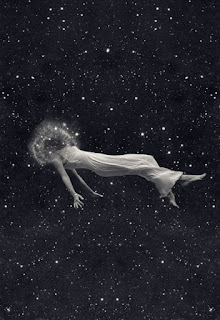Sleep and the Dream: Two Sides of the Same Coin
"Wake up. You've been in a coma for the last seventeen years. I don't know if this message will reach you, or where in your dream you will hear me, but it's time to wake up and open your eyes."
This was a little joke, stolen from the internet, that my friends would pull on me whenever I had just woken up, confused and disoriented. It was a sick, sadistic little way of pulling my leg--especially given my existential angst and generalized anxiety--but I'd be a blatant liar if I told you that I didn't find it just as hilarious as they did, once the impending sense of doom had passed and the realization that my friends simply have a twisted sense of humor set in. But what if it wasn't just a prank? In fact, what if we've all been asleep this entire time? This is the concept which the brilliant writers, Henry David Thoreau and Ta-Nehisi Coates, touch on in their works, Where I Lived, and What I Lived For and Between the World and Me, respectively.
In his autobiography, Thoreau makes the bold claim that he has never encountered a man who was truly conscious: "To be awake is to be alive. I have never yet met a man who was quite awake" (6). In making these two statements, he is establishing that he has never met a man who was truly alive, but that brings up the question, what does it really mean to be alive? Philosophical questions such as this are arguably impossible to answer completely, but Thoreau continues to elaborate on the idea of being asleep throughout our lives when he states, "The millions are awake enough for physical labor; but only one in a million is awake enough for effective intellectual exertion, only one in a hundred million to a poetic or divine life" (6). The millions of people that he refers to describes the majority of us--mindlessly and aimlessly wandering throughout our lives, following the path that has always been labeled as the "correct" one: go to school, go to college, get a job, get a family, and retire. But we've never stopped to ask ourselves, for what end-goal are we struggling? At our place of occupation--often an occupation that we don't truly enjoy--we complete tedious tasks and busy work, simply because it is what we are told to do, without question. Often children will say, "I want to go to a good college, so I can make money and retire peacefully." So for years and years, we are meant to suffer through the tiresome labors of life, just for a few peaceful years of rest before our inevitable deaths? It's heartbreaking. It is a rarity to find a person who genuinely questions the facets of the universe, and it is even rarer to find a person who strives to improve upon it or who is able to derive undeniable meaning from his or her own life. Put simply, it is our ignorance and our willingness to swallow the pre-established ideas that the world has placed in front of us which perpetuate our slumber.
Similarly, Coates refers to many Americans as "Dreamers" throughout the entirety of his novel, and he says, "The Dream is treehouses and the Cub Scouts... And for so long I have wanted to escape into the Dream, to fold my country over my head like a blanket" (11). Of course, Coates is referring to the American Dream--the idea that our country is built on freedom and opportunity, and that anybody has the potential to achieve success and greatness through hard work and dedication. However, I believe that in referring to the "dream," Coates is also describing our lack of consciousness--how we as a nation have chosen to delude ourselves into justifying our inaction against injustice, chosen to pull the wool over our own eyes in an effort to stop seeing the blood we've spilled. I would argue that Coates falls into the one in a million that Thoreau refers to, a man who has chosen to open his eyes to the ignorance surrounding him. As Coates so eloquently put it, "I would not have you descend into your own dream. I would have you be a conscious citizen of this terrible and beautiful world" (108). Although Coates speaks of injustice and Thoreau speaks of labor, the both of them wish for society as a whole to see the world for what it truly is, imperfect though it may be; only through the acknowledgement of the triumphs and of the atrocities that we've created, will we ever be able to flourish.
But what can be done to rectify the mistakes of our predecessors? What can we, as small and inconsequential humans in a vast universe of adversity and wretchedness, do now? The fact is that ultimately, you and I are powerless over everyone and everything but ourselves. Reality is not so benevolent, and the God of your understanding is not so gracious; the universe has never and will never grant us the capability to control anything more. Having said all that, control over ourselves and our choices is a gift that the same diabolical world we live in has granted us. Make use of that gift: choose to live actively, choose to question the thoughts you never did before, choose to wake up and open your eyes.

Wow! You pose a ton of fascinating questions that get at our purpose as human beings and how we relate to others and the world around us. From reading Between the World and Me and your response, it becomes clear that people need to "wake up" before they can recognize and address injustice. What does it take for a person to "wake up"? What about a community or society as a whole?
ReplyDelete